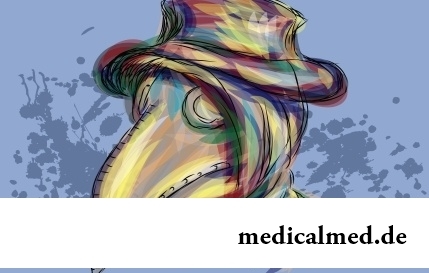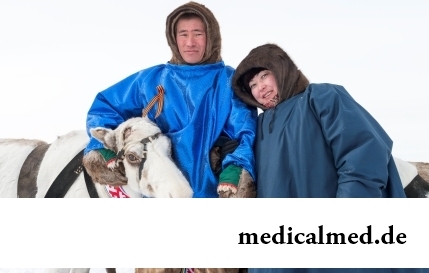





Anamnesis
Anamnesis (anamnesis; Greek anamnesis – reminiscence) – a data set, received when performing medical examination by poll of the inspected patient and/or people knowing it.
Allocate the following types of the anamnesis:
- Obstetric (obstetrica) – the part of the anamnesis devoted to genital (generative) function of the woman (the number of pregnancies, abortions and childbirth, character of complications and feature of their current, character of periods);
- Allergological (allergologica) – information on displays of allergic diseases at inspected, his relatives, and also about possible contact with allergens;
- Disease (morbi) – data on emergence and the course of this disease and efficiency of earlier carried out therapy;
- Lives (vitae) – information on physical, mental and social development inspected;
- Hereditary (hereditaria) – the part of the family anamnesis devoted to diseases of parents and other blood relatives;
- Professional (professionalis) – data on character and working conditions of the patient, for example, about existence of professional vrednost;
- Psychiatric (psychiatrica) – data on features of mental development, a warehouse of the personality, heredity, the training and professional activity inspected a circle of its inclinations and interests, family relationship;
- Family (familiaris) – a part of the anamnesis of life which is devoted to family composition of the patient, a psychological situation in it, to diseases of close relatives, etc.;
- Social – the part of the anamnesis of life including living conditions, social activity and social standing of the patient;
- Sports – the anamnesis collected at athletes which concerns their physical development, physical fitness, the mode and a technique of trainings, dynamics of sports results, portability of training loads;
- Pharmacological – the part of the anamnesis of a disease devoted to routes of administration, doses, collateral and medical to effects of earlier used drugs, and also data on medicinal intolerance;
- Epidemiological – the anamnesis collected at infectious diseases for establishment of a possible source of an infection and ways of transfer of its activator.
Was considered earlier that yawning enriches an organism with oxygen. However this opinion was disproved. Scientists proved that yawning, the person cools a brain and improves its working capacity.

On health of the person physicians know about salutary action of animals long ago. About 7 thousand years ago great Hippocrates рекоменд...
Section: Articles about health
New year, wedding, birthday, office party – an occasion to drink at the Russian person will always be. How to reduce a negative impact of alcohol by an organism and to avoid a condition of strong intoxication? The most correct council – to refuse the use spirits напитк...
Section: Articles about health
The person, as well as all other beings living on our planet feels weather changing. It is the normal meteosensitivity which is not causing to healthy people of special troubles. Meteodependence, on the contrary, is the morbid condition which is characterized by an exacerbation of chronic illnesses at change of air temperature, differences of atmospheric pressure, wind strengthening, magnetic storms and other "surprises" on which the nature is so generous. The people suffering from meteodependence have to з...
Section: Articles about health
The medicine promptly develops, and the fact that else quite recently it seemed by miracle can now. We are not surprised any more to the fact that sport...
Section: Articles about health
Each of us repeatedly noticed that the people having the same passport age are sometimes not similar on one-years at all. One at the age of 40-45 years already looks almost an old man, and another and in 60 is young, vigorous and full of life. The matter is that state нашег...
Section: Articles about health
History of mankind contains several tens of epidemics whose emergence was compared by eyewitnesses and historians to doomsday. The most terrible of them claimed the lives of millions of people, having made even the whole people to the person of the earth. What they − the diseases striking terror? Whether it managed to the person to find treatment, or he is still powerless before forces of nature?...
Section: Articles about health
Climax - process of fading of reproductive function of an organism in process of its aging. At women the main sign of its approach showing...
Section: Articles about health
Life does not indulge the modern woman special emotional comfort and carelessness. The fatigue, troubles at work, misunderstanding in a family and various illnesses immediately affect a condition of hair and skin. And to look safe and attractive so хоч...
Section: Articles about health
Practice of hypnotic impact on consciousness of the person contains about two millennia. During this time scientists managed to learn a lot of things about a phenomenon of hypnosis and learned to facilitate a condition of the patients having heavy illnesses with its help....
Section: Articles about health
Almost each of us during life faced dissatisfaction with own body. At such moments, as a rule, we beginning...
Section: Articles about health
Traveling all over the world, many try to try the most exotic dishes of national cuisines. There is even a so-called gastronomic tourism which, according to gourmets, not only allows to receive new feelings, but also is capable to show life the friend...
Section: Articles about health
Diseases of joints often begin imperceptibly for the person. The first stages of destruction of the cartilaginous tissue providing soft and free sliding of heads of bones in joint bags proceed slowly and absolutely without serious consequences. Especially unpleasantly for the fact that this process is not connected with advanced age: degradation of joint surfaces is, as a rule, noticeable after 30 years. It means that practically each able-bodied person at any time can face sad results...
Section: Articles about health
Visit of doctors – business not the most pleasant, and many people do not hurry to undergo necessary planned inspections. Such behavior...
Section: Articles about health
Stability of a hormonal background is one of the most important conditions of preservation of health of the woman. At the same time endocrine system – the thin device extremely sensitive to any external influences. Changes of an image жиз can become the reason of hormonal failure...
Section: Articles about health
Life activity of one-celled fungi of the sort Candida, related to yeast is a proximate cause of development of candidiasis (milkwoman). Normal these microorganisms are a part of the microflora living in an oral cavity and intestines of most of people and also in a female genital tract. The pathological phenomena are observed when fungi begin to breed too violently. At the same time there is an inflammatory process affecting mucous membranes and which is shown very nepr...
Section: Articles about health
Cellulitis - very widespread cosmetic shortcoming which arises approximately at 80% of women sooner or later. Emergence ег...
Section: Articles about health
All know that self-treatment is dangerous. However absolutely it is almost impossible to do without it. Rate of modern life does not allow to handle each small trouble to the doctor and information on ways of independent rendering medical the help...
Section: Articles about health
Season of activity of viral infections in the heat. Everyone can get sick, but probability of this unpleasant event it is possible and it is necessary to minimize. There is a number of rules, following to which will help or to avoid absolutely infection with flu or a SARS, or to have an illness benign and without essential complications. About ways of prevention of seasonal infections the speech in this article will also go....
Section: Articles about health
The body of the person almost for 60% consists of water. It is so important for normal functioning of an organism that loss of all is ponut...
Section: Articles about health
A little more than a century ago goat milk was a traditional food stuff of most of Russians. Unfortunately, today on tables of our compatriots it appears extremely seldom. The reason that the use of so useful product practically descended on...
Section: Articles about health
Bulimia and anorexia, are heavy deviations of a feeding behavior, become a cause of death of patients much more often than all other nervous breakdowns combined. In 60% of cases two illnesses accompany each other: patients feel horror before danger of set of excess weight and try to refuse as often as possible food, but periodically suffer from attacks of sudden hunger and an uncontrollable overeating. Each patient with anorexia and bulimia needs the help qualified пс...
Section: Articles about health
Reactive pancreatitis - the disease which is characterized by inflammatory process in a pancreas which arises more often everything...
Section: Articles about health
Striya (extension) are the defects of skin having an appearance of direct or wavy strips from 1 to 10 cm long and 1-5 mm wide. In most cases at women of a striya are located on a stomach, hips, a breast or buttocks. At athletes they can appear on shoulders and внутренн...
Section: Articles about health
Each person knows that fervescence is an illness sign. However too low temperature (hypothermia), especially also can demonstrate existence of diseases when it is observed long enough. Such state is dangerous that it, unlike fever, does not give a serious inconvenience: patients usually complain only of weakness, drowsiness, apathy. Sometimes the fever and a cryesthesia in extremities joins. Many people at similar symptoms...
Section: Articles about health
The number of long-livers is very small. One person from 5 thousand lives up to age of 90 years, and the centenary boundary steps only about...
Section: Articles about health
Osteoporosis this general disease which main sign is decrease in density of a bone tissue. On distribution width it takes the fourth place among noninfectious diseases. The illness develops at mature age more often: in our country to them harvest seasons...
Section: Articles about health
The advantage of swimming for the person is so high that this sport is not only the most popular, but also is widely applied in medicine and rehabilitation processes. If you look for for yourself the occupation allowing pleasantly and to spend time, then swimming with advantage – the fact that it is necessary for you. And give learns several facts about swimming....
Section: Slideshow
